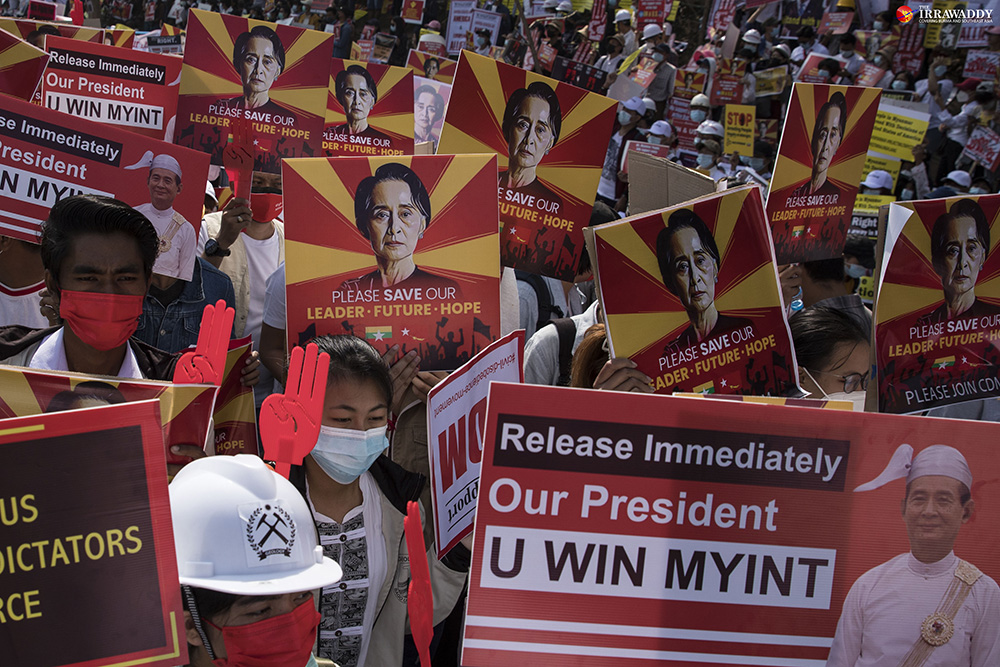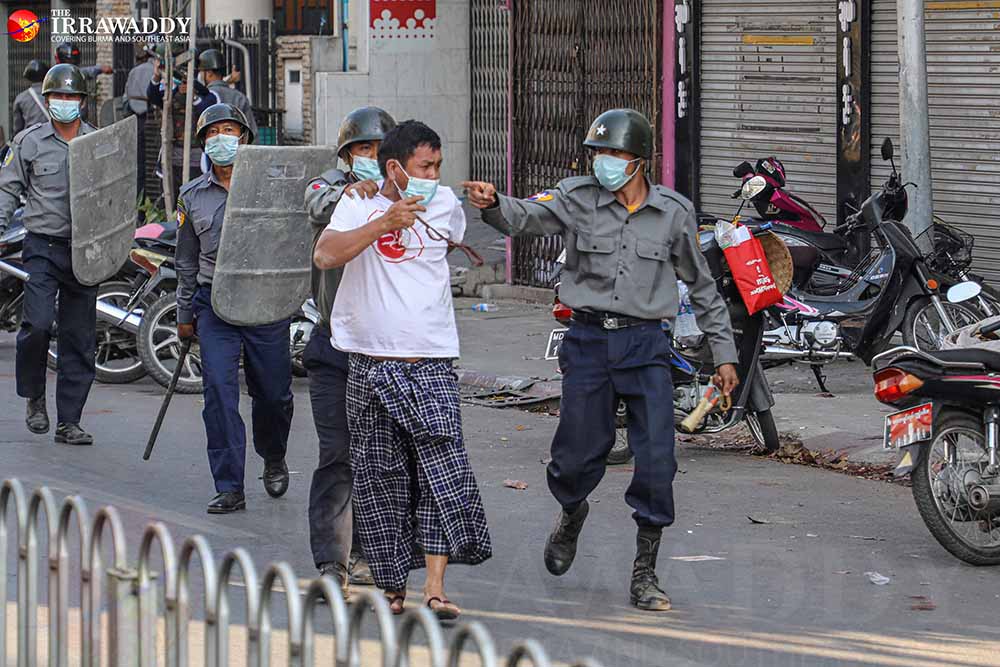Over the weekend, Myanmar’s military regime introduced a number of legal changes, scrapping laws that constrain security forces from detaining dissidents and breaching privacy, reinstating the notorious overnight guest registration requirement, and imposing new punishments against protesters.
The changes have been widely condemned as attempting to legalize the regime’s crackdown on the opposition; despite the widely held view that the coup it staged on Feb. 1 was unconstitutional, military leaders have been at pains to say that they are protecting, and acting within, the 2008 Constitution and existing laws.
On Saturday, it suspended democratic provisions of the privacy law and reinstated mandatory overnight guest registration, a notorious provision—abolished by the Union Parliament in 2016—that was used by past regimes to allow authorities to conduct warrantless midnight inspections and breaches of privacy. Its return allows security forces to hunt down opponents, make arrests and search private properties without a warrant.
The amendments came amid condemnation of many actions conducted by the regime since the coup as illegal and unjustified, including late-night warrantless arrests, raids and the locking up of civilians without charge for more than 24 hours.
The suspended provisions of the Privacy Law prohibited household arrests and inspections without a warrant, as well as state surveillance of individuals and their private communications and detention of civilians for more than 24 hours without a court ruling.
Lawyer U Khin Maung Zaw said that while undemocratic provisions were restored, democratic ones ensuring protection of privacy and security of individuals being abused by authorities were removed, referring to the suspensions of the privacy law’s provisions.

On Sunday, the military regime also amended the country’s high treason and sedition laws. The move was seen as an attempt to protect the military leaders who seized power in a coup on Feb. 1, amid claims by lawyers that coup leader Senior General Min Aung Hlaing could be charged with high treason, and as the Committee Representing Pyidaungsu Hluttaw (CRPH) prepares to prosecute the military council under high treason and other charges. The CRPH is a self-declared parliamentary committee formed by lawmakers elected to the Parliament that was dissolved by the coup. The Pyidaungsu Hluttaw is Myanmar’s Union Parliament.
“He made the amendment to use it for himself; it is not the law,” said legal adviser Sai Aung Myint Oo. “They amended the law to prevent the next government or authorities from prosecuting them. But in fact, they can still be prosecuted retrospectively,” he said.
While the original Article 121 of the Penal Code says anyone who “attempts or otherwise prepares by force of arms or other violent means to overthrow the organs of the Union or of its constituent units established by the Constitution” is guilty of high treason, the coup leader has amended it so that only “unconstitutional” use of force of arms constitutes high treason, meaning it is acceptable to use force of arms as long as it is done in line with the Constitution.
The military regime also expanded the definition of, and imposed tougher punishments on, the crime of sedition under the Penal Code, with the clear aim of targeting anti-coup protesters. The crime now covers those found to have incited hatred or contempt and disaffection towards the military and military personnel, or any effort to sabotage or hinder the success of the Defense Services and law enforcement organizations. The crime now carries a penalty of up to 20 years’ imprisonment.
Legal adviser U Khin Maung Myint said the recent legal changes pose a serious threat to the liberty and security of individual citizens.
“It appear the prosecuting institution’s authority was expanded, as it can arrest anyone it wants without giving a reason, and detain people without a court ruling, while the rights of citizens have been severely curtailed.”
Lawyer U Kyee Myint, however, said legal amendments that attempt to justify the military’s power grab are not binding, as the military seized power “unconstitutionally”.
Article 417 of the Constitution requires the President to declare a state of emergency when there is a risk to the sovereignty of the country. Article 418 requires the President to hand over all power to the Commander-in-Chief of Defense Services. Contrary to this provision, the state of emergency following the recent coup was declared by the military’s hand-picked vice-president, General Myint Swe, after the military detained President Win Myint.

Besides the above legal changes, the military government also seeks to impose a new cybersecurity law that would grant it almost unlimited power to access user data, ban content it dislikes, restrict internet providers and intercept data, and imprison opponents of the regime who express their views on the internet, as well as officials at noncomplying companies.
It would also enable the regime to arrest anyone accessing sites such as Facebook, which is still banned in the country, via virtual private network (VPN) applications.
Rights groups both local and international have condemned the draft law, saying it would violate human rights and freedom of expression. Business groups, many of them tech companies, have also raised the alarm, as the draft law would enable the authorities to intervene in business operations at their unfettered discretion.
“I would say laws that go against justice, made for the benefit of those in power, are not laws. If this is the situation, it is fair when the public goes against those,” lawyer U Khin Maung Zaw told The Irrawaddy.
You may also like these stories:
Myanmar Military’s New Education Minister Faced Finance Probes
Myanmar Journalists Leave Jobs in Face of Military Regime Restrictions on Media Freedom
Six More Myanmar Celebrities to Face Arrest for Support of Civil Disobedience Movement

















